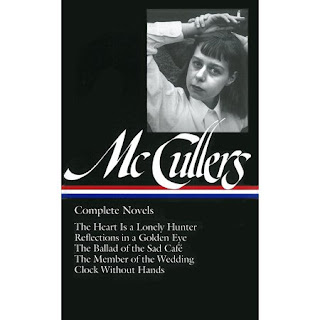I am finding retirement to be a time for tackling authors I always meant to read, but never could find the time to do so. One of those authors is Carson McCullers. Her classic The Heart is a Lonely Hunter has been on my reading list for a long time. I’ve just started reading the Library of America collection of her Complete Novels.
I did not begin with Lonely Hunter however, I picked her last novel instead, Clock Without Hands, published in 1961. It is a “Southern Gothic” text set in the town of Milan, Georgia. The selection was made because of its relevance to current (2019) political events. Clock Without Hands has four main characters, one of whom is a proud segregationist former Congressman. The former Congressman is called “Judge” by everyone, as a title of respect. He’s routinely referred to as one of the South’s “leading citizens.”
The plot revolves around the differing world views of the Judge, his grandson Jester, and a young African American, Sherman Pew – so named because he was abandoned at birth, left in a church pew. Today we look at this debate and wonder how the Judge’s “old South” world view was ever tolerated, rather on accepted as politically tenable in the halls of Congress, and we question the excuse of “that’s the way it was back then.”
The book’s end coincides with the Supreme Court decision ordering the integration of public schools, a KKK meeting convened by the Judge & the local Sheriff, and a bombing.
The fourth main character in the book is the town
pharmacist, J.T. Malone. While he is involved
in the main plot, his subplot (inserted for symbolism) is heart wrenching, in Chapter 1 he is
diagnosed with leukemia. He dies in the book's final paragraph.
McCullers’ writing is incredible, flawless. Her status as a cutting-edge author is secured by a pantheon of stories with plots and characters that remain controversial
today, and were definitely taboo in the 50’s and into the 60’s. Her depiction of the small-town South of that
era is frightening, and I dare say on target.
My only prior exposure to McCullers is the movie adaptation
of Reflections in a Golden Eye, starring Marlon Brando and
Elizabeth Taylor. I will definitely read
it, as well as the other seven novels in the collection.
In her personal life, McCullers was friends
with Tennessee Williams, another author identified with the South. I did not know that until reading the
Wikipedia post on her when I finished Clock Without Hands. That friendship is apparent however because as I
was reading the book, the similarities between the Judge, and “Big Daddy,” a
character in Williams’ classic Cat on a Hot Tin Roof had occurred
to me – not as a plagiarism issue, but one of character construction in
Southern literature.
Recommendation: Yes,
absolutely.


No comments:
Post a Comment